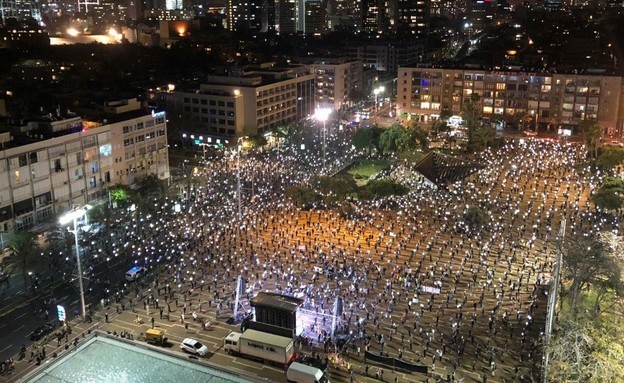Far-right governmental ministers are reportedly pushing to limit the size of protests as part of restrictions ostensibly aimed at containing the coronavirus. Until now, protests have been one of the few public activities allowed under Israel’s strict lockdown rules. The most prominent of these protests have been political in nature directed against far-right and corrupt Prime Minister Benjamin Netanyahu, but small businesses owners, self-employed Israelis and workers in industries hit hard by the curbs on economic activity have also been holding rallies over the lack of assistance from the government.

While adhering to social distancing regulations, thousands participate in a “Black Flag Protest” that was held Sunday evening, April 19, in Rabin Square in Central Tel Aviv. (Footage: Black Flag)
In a special cabinet meeting convened on Friday, April 24, during which ministers approved lifting further restrictions on businesses, Public Security Minister Gilad Erdan argued that “police were unable to enforce social distancing guidelines” at large protests and it was therefore necessary to cap the number of people taking part in demonstrations. Erdan, whose ministry oversees the national police, said general guidelines limiting protests should be drawn up and called for the cabinet to hold a vote approving them.
Aside from the purported concern about enforcing social distancing in demonstrations, the fear of a huge wave of social and political protests is growing among ministers. According to Haaretz, officers from an Israeli military intelligence unit took part in discussions of a committee appointed by the National Security Council which, among other things, recommended an awareness campaign against a possible popular uprising and whose members are taking part in discussions concerning protests and measures prevent social unrest amidst the COVID-19 pandemic.
The largest protests, drawing thousands of participants, since the arrival of the pandemic in Israel were held last night, Saturday April 25, and a week ago on Sunday, April 19, in Rabin Square in central Tel Aviv, both organized by the “Black Flag Movement” to demonstrate against the erosion of Israeli democracy under Netanyahu and his indictment on corruption charges. However, demonstrators have also protested against Benny Gantz’s Blue & White for working to form a coalition with Netanyahu’s Likud, the terms of the agreement for which were reach during this past week.
Thursday night, April 23, artists and workers employed by cultural organizations held a demonstration in Rabin Square calling for the government, “Not to turn the lights off on culture.” While there were no performances at the demonstration, many artists were on hand, including musicians who addressed the crowd like Aviv Geffen, Shlomo Artzi, Shalom Hanoch and Berry Sakharof, and who signed a petition circulated by the rally’s organizers calling for the government to give immediate and substantial relief to those who work in culture, the arts and related industries. The rally strictly abided by social distancing rules by keeping participants two meters apart and insisting that everyone wear masks. Consistent with the motto of the rally not to turn off the lights, 150 lanterns were displayed during the event to symbolize the more than 150,000 Israelis who work in industries related to culture, arts and events who have been out of work for nearly two months as a result of the pandemic.
Earlier on Thursday two other demonstration were held, one by self-employed and workers in the southern city of Eilat and the other by small business owners near Netanyahu’s home in Caesarea.
Related:
- MK Odeh: For Most Israeli Citizens, the Unity Deal is a Slap in the Face
- Thousands Rally in TA; Hadash MK Odeh Calls for a Broad Jewish-Arab Coalition for Peace and Democracy


